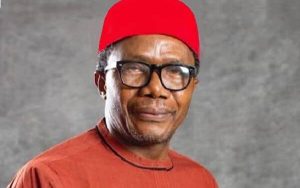
Nkasiobi Oluikpe
When the German poet and playwright, Johann Wolfgang von Goethe, was quoted as saying that ‘It is bad governments, not bad people, who cause revolutions, he didn’t have Nigeria in mind. However, situations in the country is beginning to appear as if that quote was targeted at Nigeria.
Also, Nigel Farage, British broadcaster and former politician once noted that the banking system collapse was caused, more than anything else, by bad government policy and total failure of regulation, rather than by greed. This quote which was made against the British government, now mirrors Nigeria’s current situation.
What is currently happening in the country as a result of government’s miscalculated fiscal policy is only akin to what happens in war situations. It is only in war situations that people would have money in the banks but not able to access their money. And there have been blames and counter-blames as to who is responsible for the scarcity, none of which has translated in easing the attendant hardship on the masses.
Some pundits have argued that it is a hidden agenda to sabotage the electoral process; others lay the blame at the doorstep of the banks. In fact, just this past week, a coalition of civil society groups, staged a protest against the banks, stating they were the ones sabotaging the CBN policy.
The situation is almost grounding the economic life of the citizenry, forcing some to take laws into their hands. Of particular note is the mob action of angry protesters at the Agodi branch of Wema Bank in Ibadan, Oyo State, where they were seen breaking the ATM machines, smashing vehicles parked within the bank premises and throwing stones and other harmful implements inside the banking hall, leading the staff to scamper to safety.
At an ATM at University of Benin in Edo State, a soldier was seen beaten mercilessly and humilated by students on queue the machine, for trying to use the instrumentality of his uniform to jump the queue.
The stories are no different in Lagos and several other places where people sit around the ATMs like beggars hoping and praying that the banks load their ATMs since the regulatory body, CBN, instructed that no one be paid across the counter.
There have even been cases where people go naked, shouting and some even crying inside the banking hall, begging for their accounts to be closed and their money paid them rather than having them in the banks and not being able to access them. Remember the CBN is talking about cashless policy, which is aimed at mopping up cash as well as capturing the unbanked into its dragnet. These and several other unreported cases is the sorry state that the country has slid into since the count down to the expiration of this currency change fiscal policy.
The Finance Minister, Zainab Ahmed, during a press conference in Abuja, admitted that Nigerians were struggling to lay hands on their money. She went further to say that amid the commotion caused by the scarcity of the naira, there were gains, so Nigerians should be patient as the process will soon come to an end. However, bearing the Nigerian factor, the citizens are asking how soon will soon be, as the situation appear to have lingered?
The UK last year, 2022, exchanged its £20 and £50 notes. Towards the September 22 deadline, people were advised to, besides going to the banks for the exchange, send their old notes through post to the banks or even go to the post offices to exchange them rather than having to wait for more than one hour on queues in the bank. For having to wait for just one hour, the Bank of England issued an apology. Meanwhile, Nigerians are spending almost the whole day and some said to be sleeping around the ATMs to ensure they are able to access cash as the deadline to naira exchange draws near.
In the midst of the socioeconomic crises elicited by the change, some of the questions that have agitated the minds of well-meaning Nigerians are: Should the Nigerian government always wait for situation to degenerate to chaotic levels before mitigating measures are put in place? Is a responsible government supposed to make a blanket policy without foreseeing and making projections for a fallout from the policy? Is the banking system supposed to inflict and heighten the suffering of the masses or alleviate them? What exactly are the roles of the CBN?
A healthy banking sector is the major driver of economic growth in any country, it functions as the heart and lifeblood of any functioning economy. It accepts cash from depositors for safe keeping. This singular act, ensures financial discipline and helps to control inflation. This cash is supposed to be made available to the depositor at any given time of their choice. Other functions of the banks are granting credit facilities to would-be borrowers and serving as intermediaries between depositors and borrowers.
The banks do not operate in and of their own. The government that understands the importance of strong, healthy banks, through its regulatory body, the CBN, provides sound supervision and a legal framework within which banks can operate. Only then can the banking system accomplish its primary roles—that of providing a safe haven for the funds of the public and a means to devote those funds in productive loans to build the economy. In a nutshell, the banks are answerable to the CBN.
The CBN, by virtue of its statutory responsibility and position, is the highest financial institution in Nigeria, it is fundamentally, the only financial body that has the full right to print and issue legal tender in the country. It strengthens the banking structure by making sure that, deposit insurance is ensured. It achieves this function through the extension of banking infrastructure and facilities, in the areas where there are none. It is supposed to supervise other banks and financial houses in the country, and also control them. It issues licences to them and makes sure their operations are inspected regularly.
The Central Bank, not just of Nigeria but all over the world, is charged with the responsibility of maintaining monetary stability by promoting reliable, and efficient transactions, as well as, smooth operations in the banking system. Maintaining monetary stability helps to ensure price stability and price stability ensures inflation is curbed to the barest. Summarily, the bulk of the blame rests with the CBN.
However, CSR Reporters sought the view of a public analyst and economist, Muda Yusuf, former D-G of the Lagos Chambers of Commerce and Industry (LCCI), who condemned the activity of the coalition of CSOs and stated that they were very likely sponsored. Why would the CSOs by shifting blames, he asked.
“What of the CBN that came up with the policy and a timeline that is not realistic and all sorts of measures that is making it difficult for people to access their money. Is it the banks that say they should not pay over the counter? Is it not the CBN directive? Is it not the CBN that said they should not pay more than N20,000 to people. If you have a million in your account and want to withdraw N200,000, you can’t withdraw more than N20,000.
“The CBN should go and review all these policies. It doesn’t make sense because its not realistic. It is not a question of things will get better, the whole thing is completely unrealistic. And all the money of the people that they have collected they should give it to them back. How can you say you mopped up a certain amount` of money, how much did you give them back.”
Yusuf explained that the whole idea of currency swap is that when somebody gives you his money, you give him an equivalent of what he brought. If he now wants to keep it in the bank, it should be at his own discretion. It is not about sitting on peoples money in the name of cashless policy as you don’t force cashless-ness on people, he said.
Considering that the deadline is just around the corner, when asked what he thinks would happen should the CBN refuse to rescind the call for extension, Yusuf advised that the crises would have to continue with its attendant impact on the political parties.
“It is even wrong for such policy to be coming at a time like this when the political current is very high. So I don’t blame those who are suspecting that there is a hidden agenda,” he said









